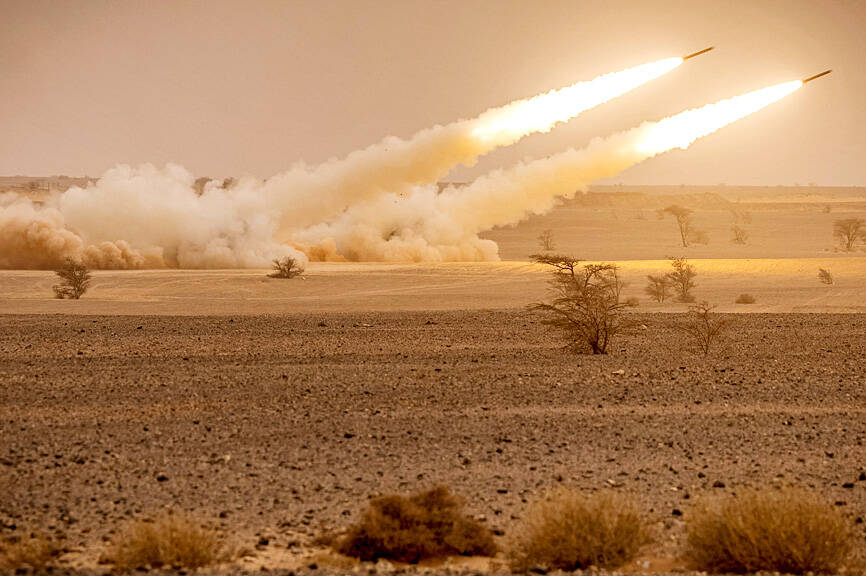The military has allocated funds to buy more M142 High Mobility Artillery Rocket System (HIMARS) launchers from the US after canceling its original plan to purchase M109A6 “Paladin” self-propelled howitzers, a proposed defense budget showed yesterday.
The proposal, which was sent to the legislature for review, indicates that the army is planning to buy 29 HIMARS, a truck-mounted, multiple-launch system, 18 more than originally planned.
It is also aiming to buy 84 ATACMS, a long-range guided missile system, up from 64 that it originally wanted, as well as 864 precision rockets that can be used by HIMARS, which has a strike distance of 300km, the proposal showed.

Photo: AFP
The total budget is set at NT$32.5 billion (US$1.07 billion), with the first batch of 11 HIMARS expected to be delivered in 2024 if the order is made, the proposal showed.
The plan is to provide high-precision, high-mobility, long-distance firepower to Taiwan’s frontline islands to eliminate invading enemy forces, as it would be difficult to quickly reinforce such locations, the army said.
The decision to buy more HIMARS was made after the army decided not to buy 40 Paladins, with the Ministry of National Defense in May saying that the US informed it that the self-propelled howitzers would not be delivered on time due to inadequate production capacity.
Instead, Washington proposed other long-range, precision-strike weapon systems such as HIMARS, the ministry said in a news release at the time.
The government last week announced its general budget plan for fiscal 2023, which showed an increase in proposed spending on national defense next year of nearly 14 percent, or more than NT$70 billion, from this year.
The money would fund the development of domestically built warships and warplanes, improve equipment and weaponry for troops, boost the nation’s reserve forces and develop asymmetrical warfare tactics, President Tsai Ing-wen (蔡英文) said.
Meanwhile, Taiwan and the US have signed a NT$21.7 billion deal for four MQ-9B SeaGuardian aerial drones with ground control stations and other support systems, with the units scheduled for delivery in 2025.
The deal inked by the air force and the American Institute in Taiwan is implemented through December 2029, when installation of the support systems is to be completed, the ministry said in a contract notice yesterday.
The contract’s implementation timetable is a year longer than previously negotiated.
The price tag includes NT$16.88 billion for the drones themselves, with the remainder for control stations, technical training and operational expenses related to the procurement, it said.
The implementation of the contract would take place partially or entirely in Hualien County, it said.
A defense official said that the drones would boost the military due to their long loiter time, all-weather observation and surveillance sensors, and their ability to launch airstrikes.
The drones can directly support combat troops, or disrupt enemy operations, the official said.

CHAOS: Iranians took to the streets playing celebratory music after reports of Khamenei’s death on Saturday, while mourners also gathered in Tehran yesterday Iranian Supreme Leader Ayatollah Ali Khamenei was killed in a major attack on Iran launched by Israel and the US, throwing the future of the Islamic republic into doubt and raising the risk of regional instability. Iranian state television and the state-run IRNA news agency announced the 86-year-old’s death early yesterday. US President Donald Trump said it gave Iranians their “greatest chance” to “take back” their country. The announcements came after a joint US and Israeli aerial bombardment that targeted Iranian military and governmental sites. Trump said the “heavy and pinpoint bombing” would continue through the week or as long

TRUST: The KMT said it respected the US’ timing and considerations, and hoped it would continue to honor its commitments to helping Taiwan bolster its defenses and deterrence US President Donald Trump is delaying a multibillion-dollar arms sale to Taiwan to ensure his visit to Beijing is successful, a New York Times report said. The weapons sales package has stalled in the US Department of State, the report said, citing US officials it did not identify. The White House has told agencies not to push forward ahead of Trump’s meeting with Chinese President Xi Jinping (習近平), it said. The two last month held a phone call to discuss trade and geopolitical flashpoints ahead of the summit. Xi raised the Taiwan issue and urged the US to handle arms sales to

BIG SPENDERS: Foreign investors bought the most Taiwan equities since 2005, signaling confidence that an AI boom would continue to benefit chipmakers Taiwan Semiconductor Manufacturing Co’s (TSMC, 台積電) market capitalization swelled to US$2 trillion for the first time following a 4.25 percent rally in its American depositary receipts (ADR) overnight, putting the world’s biggest contract chipmaker sixth on the list of the world’s biggest companies by market capitalization, just behind Amazon.com Inc. The site CompaniesMarketcap.com ranked TSMC ahead of Saudi Aramco and Meta Platforms Inc. The Taiwanese company’s ADRs on Tuesday surged to US$385.75 on the New York Stock Exchange, as strong demand for artificial intelligence (AI) applications led to chip supply constraints and boost revenue growth to record-breaking levels. Each TSMC ADR represents

State-run CPC Corp, Taiwan (CPC, 台灣中油) yesterday said that it had confirmed on Saturday night with its liquefied natural gas (LNG) and crude oil suppliers that shipments are proceeding as scheduled and that domestic supplies remain unaffected. The CPC yesterday announced the gasoline and diesel prices will rise by NT$0.2 and NT$0.4 per liter, respectively, starting Monday, citing Middle East tensions and blizzards in the eastern United States. CPC also iterated it has been reducing the proportion of crude oil imports from the Middle East and diversifying its supply sources in the past few years in response to geopolitical risks, expanding